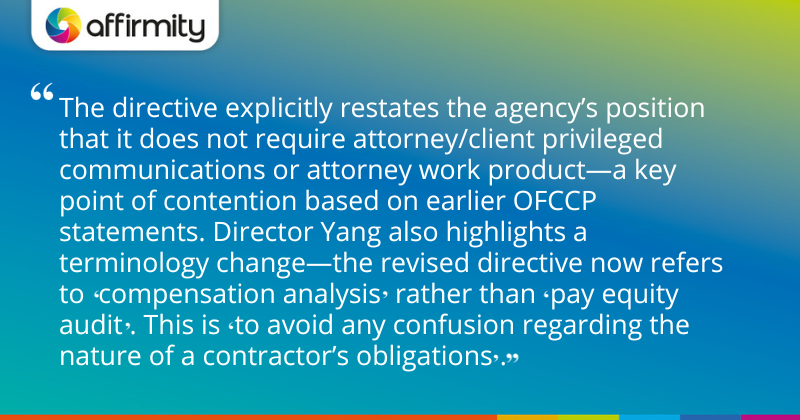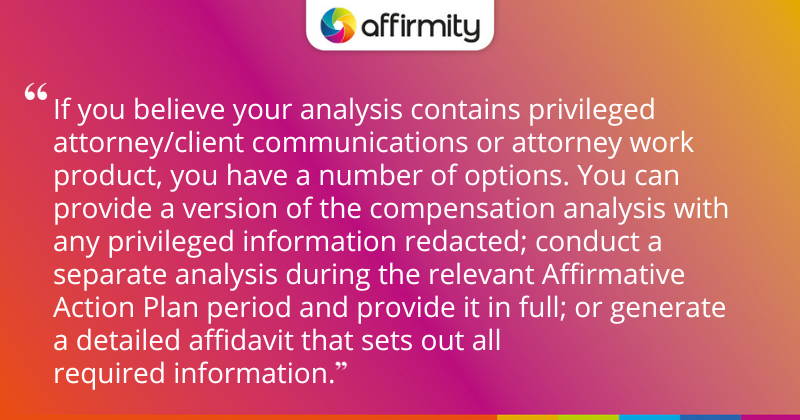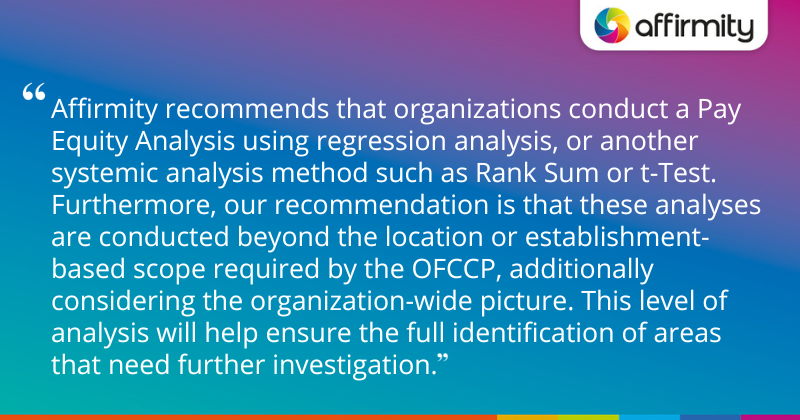A new revision to the OFCCP’s Directive (DIR) 2022-01, on the subject of “Advancing Pay Equity Through Compensation Analysis”, has clarified the OFCCP’s expectations around compensation systems and documentation compliance. Read on to discover what has been revised, what organizations are required to provide, and our recommendations going forward.
What’s In OFCCP’s Directive (DIR) 2022-01 Revision 1?
Effective as of August 18, 2022, the first revision to Directive (DIR) 2022-01 clarifies what federal contractors must provide in order to prove they’ve satisfied their obligation to conduct a compensation analysis. In a blog post announcing the revision, OFCCP Director Jenny R. Yang offered three key highlights:
- The directive explicitly restates the agency’s position that it does not require attorney/client privileged communications or attorney work product—a key point of contention based on earlier OFCCP statements.
- The directive is now said to contain detail on all required documentation necessary for proof that it has performed a compensation analysis—specifically, it details this in section 7B. We offer a closer analysis below.
- The directive also explains the documentation required from the contractor in order to demonstrate that it has implemented action-orientated programs in the event that its compensation analysis has indicated a problem—again, see section 7B or our analysis below.
Director Yang also highlights a terminology change—the revised directive now refers to “compensation analysis” rather than “pay equity audit”. This is “to avoid any confusion regarding the nature of a contractor’s obligations”.
LEARN ABOUT A PROACTIVE AAP APPROACH | ‘3 Ways to Maintain Your Affirmative Action Program and Sustain Success’

What Documentation Does the OFCCP Require for Proof of Compensation Analysis?
The OFCCP requires contractors to provide documentation that demonstrates the following:
- The completion date of the compensation analysis
- The number of employees included in the analysis, and the number and categories of employees excluded from the analysis
- The forms of compensation that were analyzed, and a description of whether any forms were combined or separated (e.g. base pay alone, base pay plus bonuses)
- That the compensation analysis was performed along gender, race, and ethnicity lines
- The method of analysis, such as:
- Multiple regression analysis
- Decomposition regression analysis
- Meta-analytic tests of z-scores
- Compa-ratio regression analysis
- Rank-sum tests
- Career-stall analysis
- Average pay ratio
- Cohort analysis
The directive encourages contractors to make their full compensation analyses available when concerns are raised during an evaluation.
If you believe your analysis contains privileged attorney/client communications or attorney work product, you have a number of options (provided that the alternative documentation satisfies the conditions above). You can:
- Provide a version of the compensation analysis with any privileged information redacted
- Conduct a separate analysis during the relevant Affirmative Action Plan period and provide it in full
- Generate a detailed affidavit that sets out all required information
The OFCCP also provides a list of recommended further information that will help it better understand your context and your evaluation approach. These recommendations include detailing:
- All evaluated pay groupings
- An explanation of the rationale and method for each pay grouping
- A description of which variables, factors, measures, or controls were considered, and how they were incorporated into the analysis (this could include items such as tenure, education, structural groupings, performance ratings, and prior experience)
- The model statistics on which any regression or global analyses were based
FROM OUR VIDEO SERIES | ‘OFCCP Compliance Series: How to Review Compensation to Identify Pay Disparities’

What Documentation Does the OFCCP Require for Proof of Action-Orientated Programs?
When a contractor’s compensation analysis identifies any problem areas, documentation must be provided to prove that the required action-orientated programs have been executed. Directive 2022-01 states that the OFCCP expects to see:
- Detail on the nature of the pay disparities found, inclusive of job category, affected groups, and extent of the disparity
- A statement that the contractor has investigated the reasons for those pay disparities found
- A statement that the contractor has instituted action-orientated programs designed to address the problem areas identified
- Detail on the nature and scope of the aforementioned programs, including the job(s) for which the programs apply and the adjustments made (for example, pay increases, amendments to policies and procedures)
- A plan for measurement of the program impact and identified barriers going forward
DETAILS FOR CONTRACTORS UNDER AUDIT | ‘How to Prepare Your Employees for On-Site Visits From OFCCP Auditors’

Conclusion: Affirmity’s Compensation Analysis Recommendations
Though the revision to the Directive has changed references of “pay equity audit” to “compensation analysis”, apparently with the aim of being more precise about the scope of employer obligations, it’s important to see the requirements above as a minimum effort. We’ve seen a pattern of greater focus on pay equity from not just the OFCCP, but from different state legislatures and other federal agencies—a minimum effort is unlikely to be an adequate effort for long.
Affirmity recommends that organizations conduct a Pay Equity Analysis using regression analysis, or another systemic analysis method such as Rank Sum or t-Test. Furthermore, our recommendation is that these analyses are conducted beyond the location or establishment-based scope required by the OFCCP, additionally considering the organization-wide picture. This level of analysis will help ensure the full identification of areas that need further investigation.
You can review how to get started with pay equity analysis in our blog post, “Getting Pay Equity Analysis Off the Ground: The First 3 Steps of Your Process”.
Affirmity can help ensure you understand your obligations and to help you maintain compliance in an ever-changing landscape. Please contact us for more information.
 About the Author
About the Author
Charles McGhee, PhD serves as Affirmity’s lead statistician. He has over 20 years of expertise in workforce compliance, in the private and public sectors. Prior to joining Affirmity, he served for 10 years as senior statistician with the Office of Federal Contract Compliance Programs (OFCCP) and Equal Employment Opportunity Commission (EEOC). Dr. McGhee holds a PhD in Biostatistics, and undergraduate and Master’s degrees in Mathematics.
